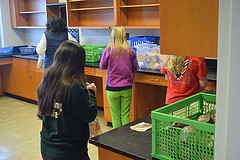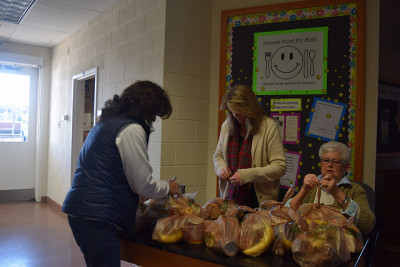Every Thursday morning, more than 100 bags of nutritious food are prepared at an old brick building in rural Oconee County.
From there, volunteer drivers take the bags to schools in the county, where teachers and other school officials drop them into the backpacks of children (grades K-12) while the kids are out of the classroom. If not for the bags, many of these children might go hungry over the weekend.
“A lot of kids count on a free or reduced breakfast and lunch Monday through Friday, but when they go home on the weekend there’s no cafeteria,” says Tyler Boykin, a counselor at High Shoals Elementary School, who helps to identify students in need of the program.
“It gives the kids who don’t have enough to eat some reassurance that they’re going to be OK over the weekend,” says Boykin.
Nearly 4,000 food bags were delivered in the 2013-14 school year.
It’s no mystery that a properly nourished student is a better prepared student. “When kids come into the classroom hungry, they aren’t ready to learn,” says Cindy Pritchard, director of the Food for Kids program.
And this is just as true in Oconee — ranked one of the state’s richest counties, with a median household income of $74,630 — as it is in Georgia’s most poverty-stricken rural areas.
The Food for Kids program is supported entirely by local grants, word-of-mouth fundraising and donations from Oconee residents.
“It’s really Oconee taking care of Oconee,” says Ann Hester, the executive director of the Oconee Area Resource Council (OARC).
Hester and Pritchard must find creative ways to keep the program alive by hosting several fundraisers per year, such as an Empty Bowls event last month.
Oconee elementary students handcrafted the ceramic bowls that were sold at the Empty Bowls dinner, and all proceeds benefited the Food for Kids program. The event, previously held at local schools, was moved to the Oconee County Civic Center due to more demand. Last year, Empty Bowls was hosted at High Shoals Elementary and raised $4,500.
Neighboring Athens-Clarke County hosted a similar Empty Bowls event Feb. 18 to support the Food Bank of Northeast Georgia.
“Our food is a little more expensive because we buy more nutritious items, but we try to keep each bag under $5,” says Pritchard.
Food for Kids is housed at the J. Phil Campbell Sr. Research and Education Center, a space provided through a partnership with the UGA Extension Services.
The storage closet is packed with canned goods, fruits, cereals and anything else collected from food drives or partnerships with local grocery stores.
At the Campbell Center, volunteer high school students work in an assembly line manner, and the work counts as certified job training.
Food for Kids doesn’t stop when school lets out. There is a summer version that makes sure hungry children don’t fall off the radar.
Oconee Summer Food for Kids reaches beyond just feeding children. It teaches them recipes and how to handle and prepare fresh produce. The produce is donated by the program’s community partner, the Oconee Farmers Market.
Hester and Pritchard struggle to shine a light on rural poverty in an affluent community.
“People think because they don’t see poverty, it doesn’t exist, but if a kid is hungry, they’re hungry,” Hester said.
And when children do come to the classroom well fed, Pritchard says, “It works better for that child, it works better for the other children in the classroom, and it’s easier for the teacher to instruct.”
Food for Kids welcomes donations of any amount, but donors have the option of giving $240 to sponsor one child for a whole year. For more information, or to donate, visit oconeeconnection.org
Chris McGee is a graduate student in the Health and Medical Communication program at the University of Georgia. McGee is currently interested in researching and reporting interests on social determinants of health in low-income communities.



